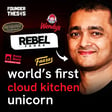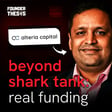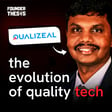
What Does It Take to Scale a Hardware Startup in India? Amit Gupta (Yulu) Has the Answers
"We have zero customer acquisition cost with a hardware business."
This seemingly impossible statement from Amit Gupta reveals a counterintuitive truth: asset-heavy businesses can create stronger competitive moats than asset-light ones. While Silicon Valley preaches software scalability, Amit proved that owning physical infrastructure can lead to supply-constrained growth where customers queue up for your product.
Amit Gupta is the Co-founder and CEO of Yulu, India's largest shared electric mobility platform with 45,000+ vehicles facilitating over 80 million rides and 20+ million monthly deliveries. Previously, he co-founded InMobi, one of India's first profitable unicorns valued at $1+ billion, where he drove global expansion across 70+ countries and helped build a $200 million revenue business. From mobile advertising networks to electric vehicle fleets, Amit has mastered the art of building category-defining companies in completely different industries.
Key Insights from the Conversation:
👉Asset-Heavy Advantage: Physical infrastructure creates defensible moats that digital competitors cannot easily replicate
👉Supply Constraint Strategy: Being supply-constrained with high demand beats demand-constrained growth models
👉EBITDA vs EBIT: Understanding the financial progression from operational profitability to full profitability in asset-heavy businesses
👉Purpose-Built Design: Custom-designed vehicles for commercial use achieve 10x better unit economics than generic products
👉Regulatory Arbitrage: Strategic product design around regulations (sub-25kmph) expanded addressable market significantly
👉Second-Time Founder Lessons: Technology focus vs business expansion - applying learnings across different industries
👉Zero CAC Achievement: Network effects in physical infrastructure leading to organic customer acquisition
Chapters:
0:00:00 - Introduction: From Family Business to Tech Entrepreneur
0:18:32 - Early Career: Software to Banking to Startups
0:26:36 - M-Khoj: SMS Search to Mobile Internet Pioneer
0:49:22 - InMobi Success: Building India's First Profitable Unicorn
1:07:21 - Glance Innovation: Lock Screen Revolution Within InMobi
1:17:37 - Yulu Genesis: Personal Traffic Frustration to Mobility Mission
1:25:28 - Product Evolution: Bicycles to Electric Vehicles Pivot
1:39:14 - Technology Deep Dive: IoT, Predictive Maintenance & Security
1:51:52 - Business Model: Asset-Heavy Strategy & Unit Economics
2:12:14 - Scaling Strategy: Direct Operations vs Franchise Model
2:24:51 - Second-Time Founder Wisdom: Key Transferable Lessons
#ElectricVehicles #SharedMobility #StartupIndia #Unicorn #AssetHeavy #Hardware #IoT #UrbanMobility #Sustainability #SecondTimeFounder #Entrepreneurship #TechStartups #MobilityTech #IndianStartups #VentureCapital #Scaling #ZeroCAC #SupplyConstrained #RegulatoryStrategy #PhysicalInfrastructure #EntrepreneurAdvice #startuplessons
Disclaimer: The views expressed are those of the speaker, not necessarily the channel.



















